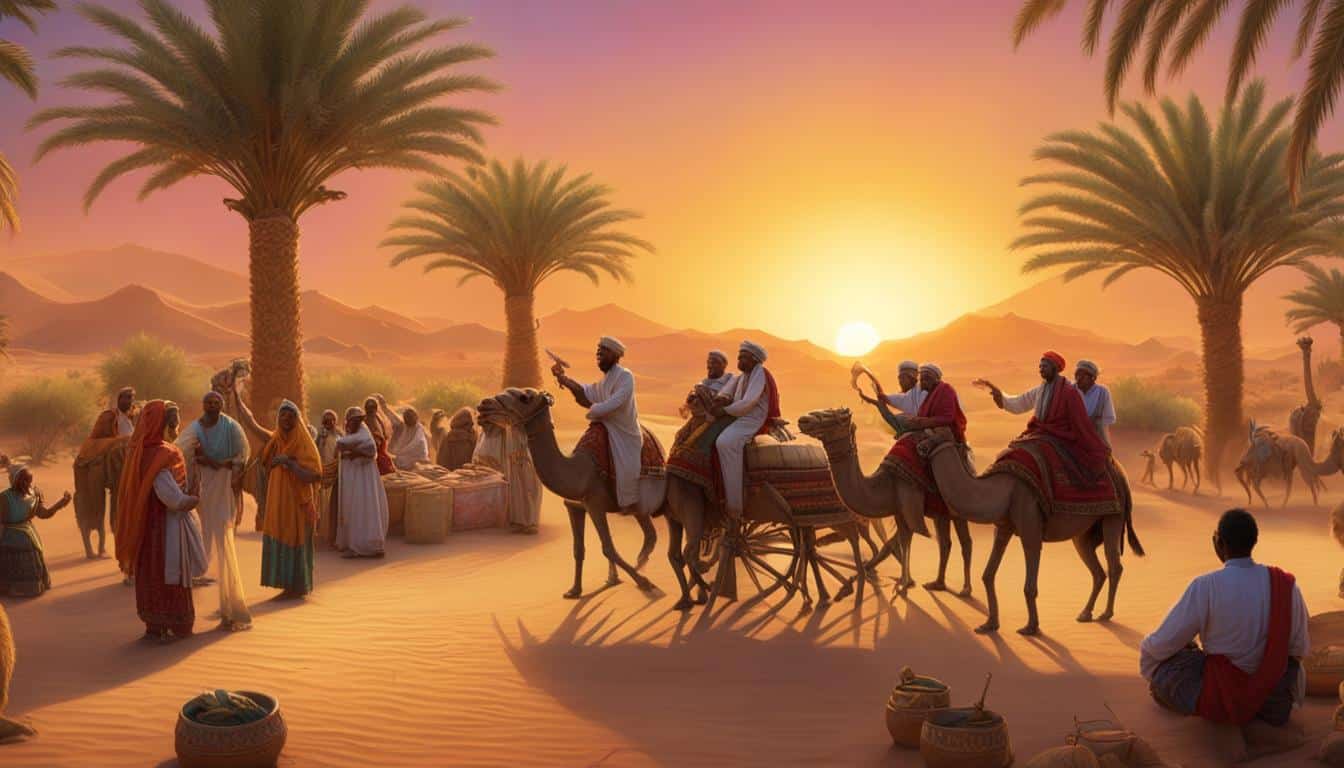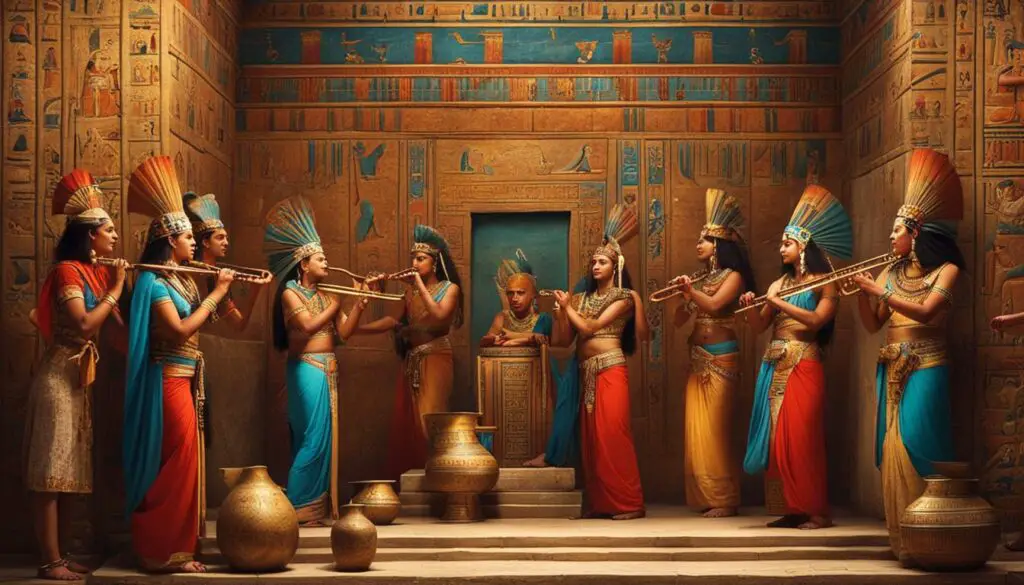
Music and Entertainment in the Biblical Era
Music played a significant role in the biblical era, with extensive references to it found throughout the Bible. The Old Testament reveals the Hebrews’ devotion to the study and practice of music, with King David playing a prominent role in establishing music as an integral part of religious rituals. The book of Psalms, often attributed to David, has been the bedrock of Judeo-Christian hymnology. Archaeological and written evidence confirms that music was an essential aspect of daily life in ancient Israel, with various instruments and vocal performances being an integral part of worship, celebrations, and prophetic expressions.
Key Takeaways:
- Music had a significant role in the biblical era, with extensive references throughout the Bible.
- King David played a prominent role in establishing music as an integral part of religious rituals.
- The book of Psalms has been the foundation of Judeo-Christian hymnology.
- Archaeological evidence confirms that music was essential in ancient Israel, used in worship, celebrations, and prophetic expressions.
- The Old Testament provides a scriptural basis for using musical instruments in worship.
Musical Instruments and Rituals in the Ancient Near East
Music in the biblical era was deeply influenced by ancient civilizations such as Egypt, Sumer, and Babylonia. These cultures had well-established traditions of music and utilized various musical instruments and rituals in their religious and social practices.
Ancient Egypt, known for its rich cultural heritage, had a vibrant music scene. Depictions on tombs and temple walls showcase musicians playing instruments like harps, flutes, and drums during religious ceremonies and social gatherings. The importance of music in Egyptian culture is evident from the variety of instruments discovered through archaeological excavations.
Similarly, the ancient Mesopotamian civilizations of Sumer and Babylonia also had a strong musical tradition. Temples in these regions had organized musical performances with singers and instrumentalists, serving as a central aspect of their religious rituals. The influence of Sumerian and Babylonian music on Hebrew culture during the biblical period is evident, with the Hebrews adopting and incorporating musical elements from their neighboring civilizations.
To gain a deeper understanding of the musical instruments and rituals in the ancient Near East, let’s explore a comparative table highlighting the key features:
| Region | Musical Instruments | Ritual Significance |
|---|---|---|
| Egypt | Harp, flute, drum | Used in religious ceremonies and social events |
| Sumer and Babylonia | Lyre, oboe, drum | Integral part of temple rituals and worship |
| Hebrew civilization | Lyre, harp, trumpet | Influenced by neighboring cultures, used in religious worship and celebrations |
This table provides a comparative overview of the musical instruments and their ritual significance in ancient Egypt, Sumer and Babylonia, and Hebrew civilization. It highlights the shared musical traditions and the influence of ancient cultures on Hebrew music during the biblical era.

Influences on Hebrew Music
The cultural exchanges between different ancient civilizations had a profound impact on Hebrew music. The Hebrews, through their interactions with neighboring cultures like Egypt, Sumer, and Babylonia, were exposed to new musical styles and instruments. As a result, they incorporated elements of these musical traditions into their own worship practices.
The influence of ancient Egyptian music is particularly noticeable in Hebrew music. The harp, which was prominent in Egyptian music, also found its place in Hebrew culture. Similarly, the lyre, an instrument commonly used in Sumerian and Babylonian music, became a significant part of Hebrew musical expression.
These cross-cultural influences enriched the musical landscape of the biblical era, giving rise to a unique blend of musical styles and instruments. The incorporation of instruments and rituals from neighboring civilizations expanded the repertoire of Hebrew music, allowing for a more diverse and vibrant worship experience.
Music in the New Testament and Christian Worship
The New Testament provides insights into the role of music in the lives of early Christians. In the Gospels, we witness Jesus and His disciples singing hymns during the Last Supper, highlighting the importance of music in communal worship. These hymns served as a means of expressing devotion and fostering a sense of unity among believers.
In the letters of Paul, we find instructions for the use of music in Christian gatherings. Paul emphasizes the significance of singing and making music from the heart to the Lord, encouraging believers to lift their voices in praise and worship. This emphasis on music as a form of spiritual expression demonstrates its integral role in the early Christian church.
Throughout history, music has continued to play a vital part in Christian worship. Songs inspired by the message of the New Testament have enriched congregational gatherings, allowing individuals to connect with their faith on a deeper level. These songs, whether traditional hymns or contemporary worship music, serve as a means of elevating the spirit and encountering the presence of God.
Today, music remains an essential aspect of Christian worship, enabling believers to express their devotion, proclaim their faith, and celebrate the goodness of God. From ancient hymns to modern worship anthems, the harmonies and melodies of Christian music continue to resonate with hearts and inspire a spirit of worship.
FAQ
Were musical instruments mentioned in the Bible?
Yes, the Bible mentions various musical instruments such as harps, lyres, flutes, oboes, drums, lutes, and rattles.
How did music play a role in ancient Israel?
Music was an integral part of religious rituals, worship, celebrations, and prophetic expressions in ancient Israel.
Which biblical figure is associated with the book of Psalms?
King David is often attributed to the book of Psalms, which has been the foundation of Judeo-Christian hymnology.
Did music have a significant place in ancient civilizations?
Yes, music had a rich tradition in ancient civilizations such as Egypt, Sumer, and Babylonia, with depictions and evidence of its participation in religious ceremonies and social entertainments.
How was music used in the early Christian church?
Music was an essential part of worship and celebration in the early Christian period, with Jesus and His disciples recorded as singing hymns during the Last Supper.
What instructions did Paul provide for music in Christian gatherings?
Paul emphasized the importance of singing and making music from the heart to the Lord in Christian gatherings.
